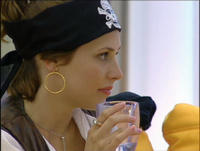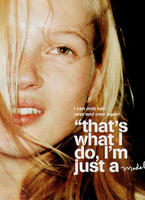Hugh Sawyer, 32, Oxford law graduate, Sotheby's bids department by day, ... ditch in the woods by night.
"I want to make people think about how much they consume that is not necessary," he told
The Observer. "I am trying to prove it is possible to do everything you normally do, maintaining a full existence, while cutting back. I have realised I can lead my life without television, carpets, sofa, electricity, chairs, tables, a fridge and a freezer."
He's also trying to raise money for the Woodland Trust. (There's a link in his blog to a site where you can make donations.)
He has clothes, books, and photographs in a rucksack, a cooking stove, a sleeping bad, and a tarp for rain. A hammock also seems to be involved. This seems totally inadequate to me. What? Not even a tent? Nor, it seems, a torch. When it's dark, he just has trouble finding things. He started with six weeks, found that "quite easy", and now aims for a year.
It's not clear that he literally lives in a ditch (is there something wrong with flat ground?), though
The Observer has a picture of him bedding down "in his Oxfordshire ditch", with a small radio in his hand and what looks like a suit jacket and tie hanging over a fence wire.
A quote from the blog:
I believe that I thought the hammock to be the most comfortable thing in the world last week when I tried it for the first time after three months of sleeping on the ground. Having just spent a week in a hotel sleeping in bed wider that I am tall I think that I might have been a little hasty with my previous beliefs. However, it was certainly nice to sleep out in the fresh air again and to hear the owls, deer and badgers. I wasn’t so sure about the Owl that woke me at about 3 am by screeching from just above my head, or the deer that woke me up by barking or even the badger that woke me up by scratching about under the hammock but other than that it was fine.
The Observer quotes psychologist John Collins saying "if he sticks it out for a year, it will be difficult for him to return to the noise of the city." Yet he works in the city, and it's not exactly noiseless where he sleeps.
"The woods are not a quiet place at night as all the animals go about their business so it takes a bit of time to get used to all the movements I guess," he writes in another blog entry; and in one for Thursday, September 08, 2005, he complains about being kept awake by police helicopters!
There's something appealing about having fewer things, but I wouldn't want to lose books, or music. (I've just turned on a radio.) Still, I think I could do without television, that "drug of the nation". Television is often unsatisfying, disposable, or just plain irritating. Is there any other area where so many people are paid so much to produce rubbish?
His blog:
Ditch MonkeyObserver article, Sunday 4 September, 2005.
Guardian article, Friday 9 September, 2005.

























